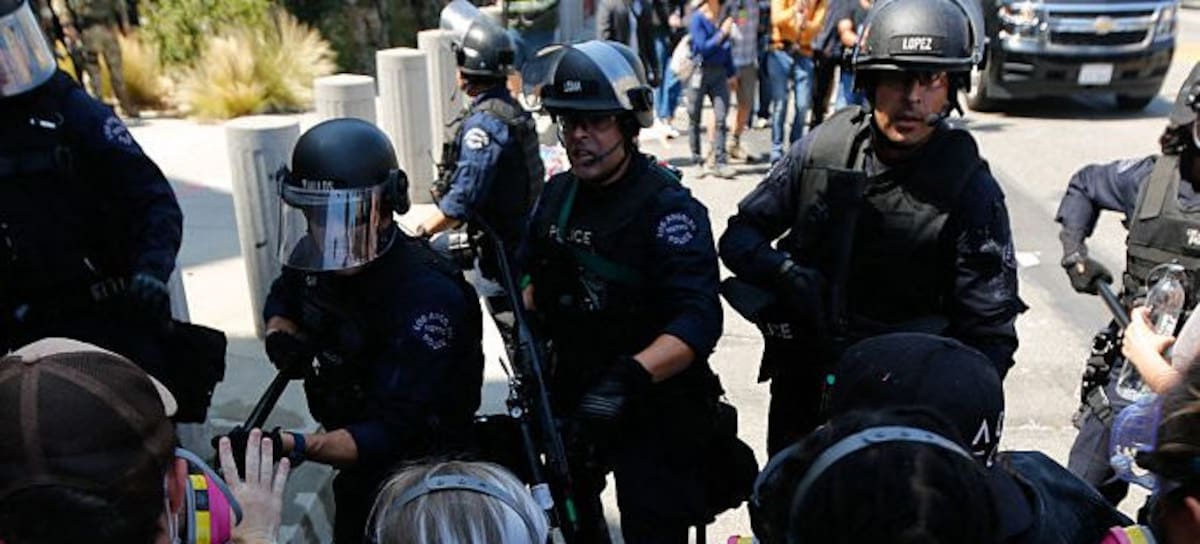Where Can Families Find Free Help Amid the ICE Detentions Crisis?
Recent arrests of parents near courts and schools have alarmed migrant communities amid President Donald Trump’s immigration policies

Protesters confront LAPD officers during an anti-ICE protest in Downtown Los Angeles, California, on June 8, 2025. The protest erupted after a wave of federal immigration raids began on June 7, with National Guard troops deployed to the city despite objections from local officials. Demonstrators called for an end to deportations and the dismantling of ICE. (Photo by Benjamin Hanson / Middle East Images via AFP) (Photo by BENJAMIN HANSON/Middle East Images/AFP via Getty Images)
Recent incidents of ICE (U.S. Immigration and Customs Enforcement) detaining parents in or around immigration courtst—and even gathering spots such as school —have alarmed many families. Videos capturing distraught parents being arrested while their children remain at school have circulated widely, intensifying concerns about family separation and uncertainty.
ICE has begun detaining individuals—often parents—during routine courthouse appearances and check-ins. In San Francisco, 15 people including a 3‑year‑old were detained at an ICE field office during check-ins, with some staying overnight without clear information.

Flames engulf an autonomous Waymo vehicle during an anti-ICE protest in downtown Los Angeles, California, on June 8, 2025. The protest erupted after a wave of federal immigration raids began on June 7, with National Guard troops deployed to the city despite objections from local officials. Demonstrators called for an end to deportations and the dismantling of ICE. Benjamin Hanson / Middle East Images via AFP / BENJAMIN HANSON

Flames engulf an autonomous Waymo vehicle during an anti-ICE protest in downtown Los Angeles, California, on June 8, 2025. The protest erupted after a wave of federal immigration raids began on June 7, with National Guard troops deployed to the city despite objections from local officials. Demonstrators called for an end to deportations and the dismantling of ICE. Benjamin Hanson / Middle East Images via AFP / BENJAMIN HANSON
These actions reflect an enforcement trend where ICE arrests people during everyday procedures, sometimes using expedited removal rules—even for long-term residents with legal status. Here are key resources and strategies that migrant families can use right now:
Access Free Legal Help
- National Immigrant Justice Center (NIJC) provides detailed “Know Your Rights” guides for interactions with ICE in courts and daily check-ins.
- Local Bar Associations like San Francisco’s are urgently seeking pro bono attorneys for detainees, especially those appearing in immigration court
- Church World Service maintains a national helpline (1‑800‑375‑1433) to connect families recently released from detention to legal, medical, and social services
- Ready to Stay offers multilingual «Know Your Rights» resources, including emergency planning tips
- Organizations like RAICES and USCRI offer legal representation, case management, and support for unaccompanied children and parents
- Use digital tools: you can check out ICE’s Online Detainee Locator System to track a detained family member with minimal information like name and birth date migrationnavigator.
- Apps like FindHello can help connect recently released individuals to local services.
- Ask Schools and Communities for Support: Teacher associations and school officials can implement emergency notification systems and record backup contact details. Many nonprofits and faith-based groups are hosting «Know Your Rights» workshops—ask at community centers and schools.
Ana Rojas
Periodista en LOS40, coordinando LOS40 USA y colaborando también en El País. Cubro temas de música,...
